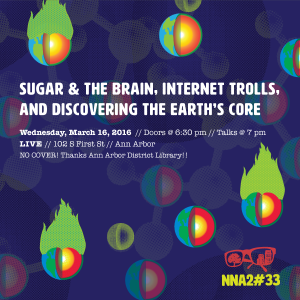
We’ve got a special WEDNESDAY edition of NNA2 headed your way this March! Monica Dus will reveal the secret of why that sugar-free cookie just ain’t the same as the real thing. Lindsay Blackwell will explain the difference between harmless and super-scary trolls on the interwebs. And Brian Worthman will take us on a journey by describing how smarty-pants scientists figured out the makeup of the Earth’s crust. Three of the greatest nerds that A2 has to offer, awesome friends, and booze to boot? Get down to LIVE to geek out with us!
When: WEDNESDAY, March 16, 2016, doors at 6:30 pm, talks at 7 pm!
Where: LIVE, 102 S First St, Ann Arbor
$$$: NO COVER! bc Ann Arbor District Library RULEZ the SCHOOLZ!!
Monica Dus: “50 Shades of Sweet: How Sugar Dominates the Brain”
We like to think we can resist life’s temptations, but ever tried saying no to a cookie? It whispers to you, it calls to you. Sugar is a powerful force: it hijacks your brain and wins nearly all the time … I’ll talk about how this happens and also how, even if your mouth is fooled by fake sugar, your brain is not.
It whispers to you, it calls to you. Sugar is a powerful force: it hijacks your brain and wins nearly all the time … I’ll talk about how this happens and also how, even if your mouth is fooled by fake sugar, your brain is not.
About Monica: I got my first microscope at age 7 and had an idyllic childhood in Italy pulling hair off Barbies and legs off bugs and looking at them under the microscope. What really drew me to science, however, was the pervasive beauty of the natural world. I still remember my first encounters with molecular biology: I was awed by its beauty and complexity. Nearly twenty years later, I still haven’t found something that is man-made and more beautiful than the natural world, not even a Dolce&Gabbana dress. I am currently a professor at University of Michigan where I head a research lab and teach genetics and neuroscience. My favorite things in life are dogs, desserts, philosophy and post-modern literature, pastel colors, unicorns, and of course, teaching.
Find her on Twitter as @Hardkandy000
Lindsay Blackwell: “Trolls, Trouble, and Telling the Difference”
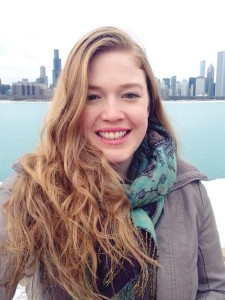 For as long as we’ve had the Internet, we’ve had online trolls. But what is a troll, really—and how do we tell the difference between trolling and more serious forms of abuse? To build a better and more empathetic web, researchers, designers, and users must work in tandem. In this talk, PhD student Lindsay Blackwell explores the ins and outs of misbehavior online, including efforts to regulate and prevent online harassment.
For as long as we’ve had the Internet, we’ve had online trolls. But what is a troll, really—and how do we tell the difference between trolling and more serious forms of abuse? To build a better and more empathetic web, researchers, designers, and users must work in tandem. In this talk, PhD student Lindsay Blackwell explores the ins and outs of misbehavior online, including efforts to regulate and prevent online harassment.
About Lindsay: Lindsay Blackwell is a PhD student at the University of Michigan School of Information’s Social Media Research Lab. Her research explores misbehavior in online communities, including trolling and online harassment. Prior to graduate school, Lindsay enjoyed a career in social media marketing, where she won several awards for her work with clients like I Love New York. You can follow Lindsay on Twitter (@linguangst) or by visiting www.lindsayblackwell.net.
Find her on Twitter as @linguangst
Brian Worthmann: “Journey to the Center of the Earth”
From the guy who brought you acoustic waves in the air and ocean a few Nerd Nites ago comes another talk about the inner layers of the Earth. 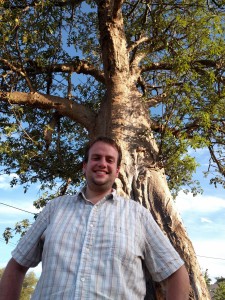 Many of us learned in high school (or earlier!) that the Earth is composed of a crust, mantle, outer core and inner core. But how do we know that? The easy answer is “well, smart scientists said so”. But assuming you consider that an unsatisfactory explanation, Brian will talk about some feats of science and engineering used in the last hundred years or so to explore what lies beneath our feet.
Many of us learned in high school (or earlier!) that the Earth is composed of a crust, mantle, outer core and inner core. But how do we know that? The easy answer is “well, smart scientists said so”. But assuming you consider that an unsatisfactory explanation, Brian will talk about some feats of science and engineering used in the last hundred years or so to explore what lies beneath our feet.
About Brian: A graduate student at the University of Michigan in the Applied Physics Department, Brian spends his not-free time researching acoustics and talking about science with whoever wants to listen. And he spends his free time nerding out pretty hard about physics, math and engineering, and binge-watching House of Cards Season 4. Brian is a 2015 RELATE alum, and also one of the newest members of the RELATE coordinator team.
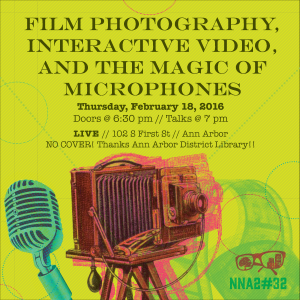
It’s Media Mania Month at Nerd Nite Ann Arbor! We’re focusing in on the life after “the death of film” by exploring the process behind and the art created with non-digital photography with historic camera expert Ross Orr. We’ll hear from Martin Thoburn, an interactive filmmaker who finds endless ways to expand his video-based art beyond the screen. Andy Ross might know more about microphones than any person to ever speak into ours – and he’ll be telling the story of the impact of mic amplification on modern music. Join us for a deep dive into audiovisual awareness, plus drinks, laughs, and a spin on a vintage 35MM Carousel projector.
When: Thursday, February 18, 2016, doors at 6:30 pm, talks at 7 pm!
Where: LIVE, 102 S First St, Ann Arbor
$$$: NO COVER! Courtesy of the Ann Arbor District Library!!
 Ross Orr – Are Film Cameras Dead, and Why Not?
Ross Orr – Are Film Cameras Dead, and Why Not?“Didn’t Kodak go bankrupt?” After the year 2000, sales of photographic film plunged by at least 95%. Yet there’s still a dedicated fringe who appreciate film’s tangible physicality and distinctive look. In a digital age, why are new converts dusting off decades-old, chunky, glass & metal cameras? For this talk we’ll bust out the 35mm Carousel projector and look at examples of why “slow photography” matters even today.
 Martin Thoburn – Beyond the Video Frame
Martin Thoburn – Beyond the Video FrameTake a walk beyond traditional filmmaking and into the world of interactive video art and video mapping. Our journey will go behind the scenes on how this artist’s projects were created from concept to execution. Discover more about the strange world of video beyond the rectangular screen.
About Martin: Martin is a local animator and artist working in a variety of different media. He has produced and directed several short films, both animated and live action. Determined not to be confined to any one medium, Martin continually explores photography, live video mixing, design, collage, animation and motion graphics. Working with both modern and antique technologies sometimes in tandem, his work explores the uniqueness of the medium, technology, and/or tool. He is involved with YPSI24 and the Ann Arbor Film Festival and you can follow him on Twitter @duiceburger, or visit
martin-thoburn.com.
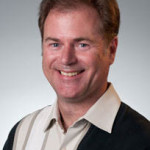 Andy Ross – Music and The Microphone
Andy Ross – Music and The MicrophoneThe invention of the microphone dramatically changed popular music, and allowed for the development of a more personal, intimate and emotional style of singing. We’ll look at, and listen to, this development.
About Andy: Andy is a web and graphic designer, and a widely exhibited artist here in Ann Arbor. He’s also a dedicated amateur musician and singer, and he has taught courses in popular culture and its impact. Find more about him at
andyrossdesign.com or follow him on Twitter @andyrossdesign.
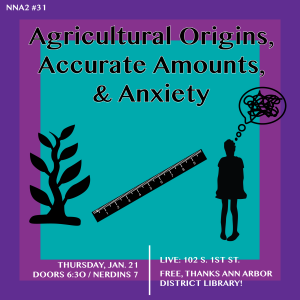 This month, Nerd Nite A2 turns FOUR! Yay, NNA2! Please join us to celebrate our anniversary and to get nerd-schooled on three fascinating topics that we likely encounter on a daily basis. If you’ve eaten food before, you’ll be interested to hear Joseph Tychonievich explain the origin stories behind fruits and veggies that we take totally for granted. Heather Wade is going to weigh the pros and cons of measurement history and it’s going to be the most accurate weighing any of you have ever experienced. Finally, Elizabeth Block is here to calmly explain how anxiety occurs and reassure you that your anxiety levels are normal – or are they???? So come on out for drinks, laughs, and some A+ nerd time.
This month, Nerd Nite A2 turns FOUR! Yay, NNA2! Please join us to celebrate our anniversary and to get nerd-schooled on three fascinating topics that we likely encounter on a daily basis. If you’ve eaten food before, you’ll be interested to hear Joseph Tychonievich explain the origin stories behind fruits and veggies that we take totally for granted. Heather Wade is going to weigh the pros and cons of measurement history and it’s going to be the most accurate weighing any of you have ever experienced. Finally, Elizabeth Block is here to calmly explain how anxiety occurs and reassure you that your anxiety levels are normal – or are they???? So come on out for drinks, laughs, and some A+ nerd time.
When: Thursday, January 21, 2016, doors at 6:30 pm, talks at 7 pm!
Where: LIVE, 102 S First St, Ann Arbor
$$$: NO COVER! Big thanks to the Ann Arbor District Library!!
Joseph Tychonievich – The Great Pleasure (and Long History) of Creating New Kinds of Plants
Basically as soon as agriculture began, humans started messing with plants, controlling their sex lives in order to transform the weeds around them into the grains and vegetables we depend on today. And while the crazy origin stories of things like corn and broccoli are in the distant past, I still use the exact same traditional methods to indulge my inner mad scientist and create new varieties of plants in my garden. The results are fun (and sometimes delicious) and will make you see the produce section of the grocery store in an entirely new way.
Heather Wade – Great, and Not So Great, Moments in Measurements: Wait! What Units Were You Using?
We encounter measurements every day, from the moment our alarm clock wakes us up and we adjust the water temperature for our shower, get dressed in clothes that fit, take doses of medicine, cook our meals & coffee, drive to work, buy gas

& groceries, turn on a light switch, pay our bills, use gas/electricity, watch TV, build anything, pay for anything. How do we know these measurements are correct? What happens when these measurements happen in another country? How do we know the measurements “translate” from country to country & language to language? International System of Units and metrological traceability are the backbone of measurements. What does that mean? What are examples of non-traceable measurements? What happens when measurements go wrong? Proper measurements bring confidence & peace-of-mind to our lives. Understanding what measurements are help to ensure better measurements happen and life goes more smoothly.
About Heather: UM grad and Calibration Officer at NSF International, headquartered here in Ann Arbor, Heather is an ASQ-Certified Calibration Technician (www.asq.org). She is a co-author of The Metrology Handbook, 2nd Edition, edited by Jay Bucher and has been published in Cal Lab Magazine: The International Journal of Metrology. She just completed her terms as Chair of ASQ’s Measurement Quality Division and also as Chair of ASQ’s Certification Board subcommittee for the ASQ-CCT. She has presented and published at national and international conferences. She also does outreach as a Metrology Ambassador. She has worked as a microbiologist, extraction and analytical chemist, and as a physical test engineer prior to embarking on her career in metrology and calibration.
Elizabeth Block, MD – Anxiety Disorders: When Worrying Gets in the Way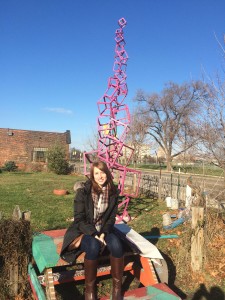
Anxiety disorders are among the most common mental health diagnosis in the United States. This talk will outline how anxiety is manifested in our bodies, common medications used to treat disorders, and therapeutic techniques used to manage (or alleviate) symptoms.
About Elizabeth: Elizabeth is a third year psychiatry resident at the University of Michigan, set to begin a fellowship in Child and Adolescent Psychiatry in July. In addition to anxiety disorders, her professional interests include psychotic disorders and increasing mental health awareness.
We hope you have a very happy holiday season!


Nerd Nite A2 is all about approaching things from new perspectives this month. Sure our phones are smart now, but let’s consider the value of making other electronic devices intelligent enough to sense and transmit useful information – such as getting a heads up from your fridge before you’ve poured recently-spoiled milk over your cereal. We’ll review the sweeter side of presidential history with a project that re-interprets U.S. presidents as cupcakes, a lens through which even the worst policy decisions can become into melt-in-your-mouth magic. And finally, we’ll think about using social media to encourage voters to get to the polls, instead of as a method of sharing cat videos – and with the November election just behind us, we’ll even get to hear about how well it works! So come hungry for nanotechnology, Commander in Chief-flavored cupcakes, and civic-minded social media and join us for another nerdy good time.
When: Thursday, November 19, 2015, doors at 6:30pm, talks at 7pm!
Where: LIVE, 102 S First St, Ann Arbor
$$$: NO COVER! Courtesy of your pal, the Ann Arbor District Library!!
 Matt DeJarld – How Nano-electronics might allow you to communicate with your refrigerator
Matt DeJarld – How Nano-electronics might allow you to communicate with your refrigeratorImagine having a refrigerator that can tell you when food has spoiled! The next technological revolution will be turning every appliance we use into a smart device. To create these devices, we need tiny sensors to allow the electronics to interact with the environment. Today these sensors are too large or too expensive, but luckily, engineers are working to reduce this sensor size and cost with the help of nano-electronics.
About Matt: Matt is a doctorate student at the University of Michigan. For the past few years, he has worked heavily with semiconductor nanostructures in efforts to improve the future of solar and indoor lighting technologies. In his free time he enjoys hiking with his dog, music, and movies/television.
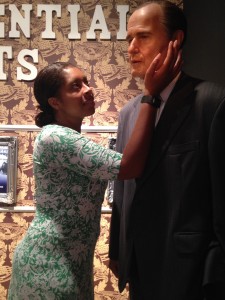 Sherlonya Turner – 35 Offbeat Ways of Looking at the POTUS
Sherlonya Turner – 35 Offbeat Ways of Looking at the POTUSSometimes the President of the United States seems larger than life. This humorous talk will bring them down to size with anecdotes that present them as more man than myth. The Head of State Cakes project, in which a cake recipe is created in honor of each president, is what happens when you cross a lifelong interest in presidential history with a love of baking. The results are not only tasty, they’re pretty fun to talk about.
About Sherlonya: Sherlonya has an all-consuming and perhaps overwhelming love for the presidents. She’s interested in them less as politicians and more as men. Her history degree helps her put things in context. Her library degree gives her research tips and tricks. Her love of cooking has inspired her to create a tribute cupcake for each US President; see them all at
headofstatecakes.com. Her son is tired of hearing her talk about Lyndon Baines Johnson, her president boyfriend.
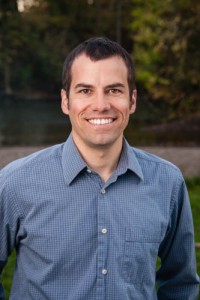 Sam Firke – Twitterbot Says Vote!
Sam Firke – Twitterbot Says Vote!There are 90,000 registered voters in Ann Arbor. Most don’t vote. I built a Twitter bot that matched voter names to Twitter accounts, then sent reminders to vote in local elections. Learn more about the problem, the project, and how it worked!
About Sam: Sam is a data analyst at an education nonprofit and a former high school math teacher. He’s active in local politics, makes things, and raises a couple of small nerdlings. He’s involved with the Ann Arbor Brewers Guild (
aabg.org) and you can find him on Twitter at @samfirke.
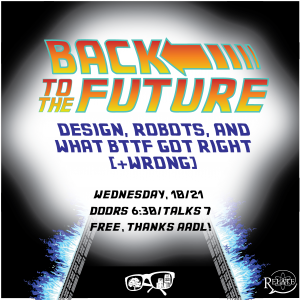
This month’s event takes us Back to the Future, because when BTTF 2 came out in 1989, October 21, 2015 seemed pretty darn future. Since we’re living in the future, we’ll talk about what the future looks like, or more accurately, what designers thought it would look like. We’ll find out the science behind instructing our (eventual) personalized robot servants to make our martinis just right. And finally, we’ll get hardcore about the Back to the Future trilogy, checking out how accurate their vision of the future really was. So power up your flux capacitors and get here for a flashback to the future!
When: Wednesday, October 21, 2015, doors at 6:30pm, talks at 7pm!
Where: LIVE, 102 S First St, Ann Arbor
$$$: NO COVER! Hey, thanks, Ann Arbor District Library!!

Nick Tobier – Where’s My Hoverboard?
Ready to assume vivid astro focus? We’ll follow the evolution of space-age design from the euphoria and optimism of the 1950s to the more cynical ‘70s, and see how artists’ conceptions of the future have influenced history and in turn, our society.
About Nick: Nick is an Associate Professor at the Stamps School of Art and Design and the Center for Entrepreneurship in the College of Engineering at the University of Michigan. With a background in sculpture and landscape architecture, Nick has long been interested in the social lives of public places and his work has been seen at the everywhere from the Edinburgh Fringe Festival to Detroit’s Brightmoor neighborhood.
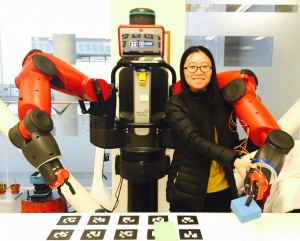
Zhen Zeng – Everyone Can Teach a Robot
Ever felt too busy to do the laundry or too tired to cook? What if a robot could help you with all of this someday in the future? Developments in robotics are bringing this dream closer to reality by making robots that can imitate people and learn new actions. One day, you may be teaching your own robot how to make your favorite cocktail!
About Zhen: Zhen is a PHD student at the University of Michigan in Electrical Engineering, with a focus on robot object manipulation. When she’s not teaching Baxter the Robot to see, move, and think, she enjoys volleyball and card games.
 Eli Neiburger – Back to the Future of Back to the Future
Eli Neiburger – Back to the Future of Back to the Future
It’s the Future today! October 21, 2015 is the day Marty McFly visits in Back to the Future 2. Let’s take a detailed look at what they thought today would be like 30 years ago, and see what they missed, and what they nailed. READ MY FAX!
About Eli: Eli is Deputy Director at the Ann Arbor District Library and has given lots of talks across the US, Europe, Australia and New Zealand, but this is his very first talk that’s not about libraries! You may have seen him leading the Nintendoland Family Band at the Water Hill Music Festival. You can follow him on Twitter at @ulotrichous.
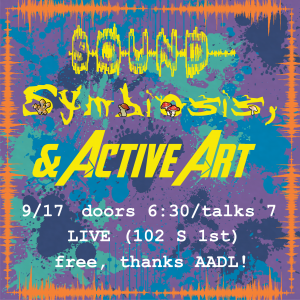
This month our topics go from down in the dirt (plant and fungi symbiosis!) to long-distance sounds to local examples of art in action. What our three featured nerds have in common, however, is that they each have a passion for their topic and want you to understand it too! So, whether you consider yourself an art aficionado, a sound geek, a plant-lover or beyond, we’ve got plenty of new stuff for you to pick up while you’re tipping back a beer. Grab a drink, grab a friend, and we’ll see you at LIVE on September 17th!
When: September 17, 2015, doors at 6:30 pm, talks at 7 pm!
Where: LIVE, 102 S. First St. in Ann Arbor
$$$: No cover! Big thanks to the Ann Arbor District Library!
Brian Worthmann — The Sound Heard ‘Round the World’
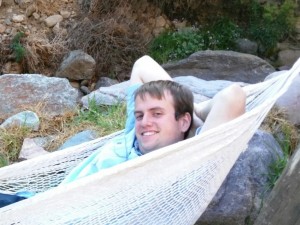
In our daily lives, we’re used to sound traveling as short as a fraction of an inch (like music from headphones) to as far as several hundred yards (like a football game heard several blocks away). But, over even larger distances, like tens, hundreds, or even thousands of miles, sound can do some very weird and unexpected things. We’ll talk about what sound does, why it does it, and how those surprising behaviors may have influenced the course of history.
About Brian: Worthmann is a PhD student at U of M in Applied Physics studying underwater acoustics and signal processing and was a participant in the
RELATE 2015 workshop. When not doing underwater acoustics research, he can be found learning, teaching, or binge-watching Netflix.
Alex Taylor — Underground Alliances
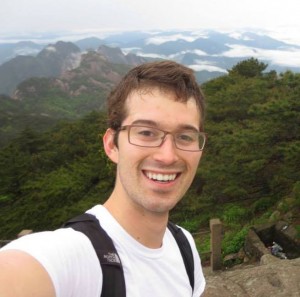
Nearly all plants form intimate symbiotic partnerships with fungi called Mychorrhizae. These fungi grow in elaborate webs through the soil, and then into the plan roots, growing even inside the plant cells, where the plant and fungus have struck a fabulously successful deal. The terms of this deal are straightforward: a trade of sugar for mineral nutrients that plays to the strengths and weaknesses of each partner. Mycorrhizae helped early plants get a toehold on land, and to this day, the vast majority of plants across the globe thrive thanks to their fungal partners. The world would be a barren place without this ancient and strange symbiosis.
About Alex: Alex is a Ph.D student in Ecology and Evolutionary Biology, studying how plants evolved the ability to recognize and partner with bacteria and fungi in the soil. Most days, this involves sitting at a computer and running algorithms on the genome sequences of different plants. He also loves talking and writing about the spine-tingling majesty of science, and co-founded the blog “Thought and Awe” to do just that. In his spare time, Alex is into camping, gardening, and talking about the big stuff over a beer. Find him on Twitter at @ATayters.
Brenda Oelbaum – Stitch and Bitch: Hopefully a Comedy
Oelbaum, current President of the
National Women’s Caucus for Art, will share some of the ins and outs of her work in organizing a national arts non-profit and what that has to do with embroidering little black velveteen bags with gold numbers while she juggles those challenges and troubles. She invites members of the audience to fill the bags she provides with a problem to add to the mound of problems in her upcoming social practice performance and installation at POP-X Ann Arbor.
Pens and paper will be provided for attendees to write down their most troubling problem to contribute to her already heavy load. Contributors can then come by the installation running October 15-25, read some problems of others, and decide if they want to take their own bag back, or buy someone else’s problem as a souvenir.
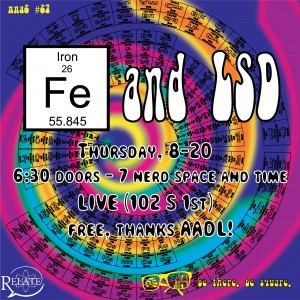 What’s all the “Fe”ss about? We’re not the only organisms that need Iron, which can mean we have some competition in getting the nutrients we need. Ada Hagan breaks down the ins and outs of Iron and bacteria. Even the most well-nourished body and brain can still learn a LOT about consciousness and psychoactive substances. Research on psychedelics is only just now recovering fromits implosion in the 70s, following the heydey of LSD research in the 60s. What does our current understanding of the brain tell us about the psychadelic experience? Dr. George A. Mashour walks us through a little research history and leads us through his present exploration of ketamine.
What’s all the “Fe”ss about? We’re not the only organisms that need Iron, which can mean we have some competition in getting the nutrients we need. Ada Hagan breaks down the ins and outs of Iron and bacteria. Even the most well-nourished body and brain can still learn a LOT about consciousness and psychoactive substances. Research on psychedelics is only just now recovering fromits implosion in the 70s, following the heydey of LSD research in the 60s. What does our current understanding of the brain tell us about the psychadelic experience? Dr. George A. Mashour walks us through a little research history and leads us through his present exploration of ketamine.
Mark your calendar, grab a friend, and say hey to a fellow nerd! We’ll see you at LIVE with a frosty beverage in hand for August’s edition of Nerd Nite!
When: August 20: 6:30 doors, 7pm nerd space and time
Where: LIVE, 102 S First St, Ann Arbor
$$$: NO COVER because Ann Arbor District Library!
The Battle for Iron: What’s all the “Fe”ss about? – Ada Hagan
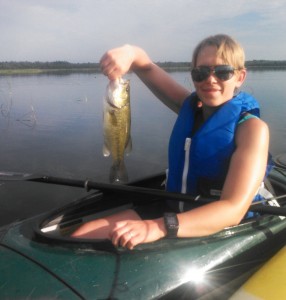
989.535.5
Iron is an important nutrient that we all make sure to get enough of in our diets. Did you know bacteria need it too though? Come learn about the battle invading bacteria wage against your body over iron atoms. Those bacteria have some pretty cool tricks up their sleeves, but so do we! That is, if we learn enough about it…
About Ada: Ada is a PhD student in Microbiology and Immunology and spends her days doing recon on the strategies bacteria use to invade our bodies. She is passionate about communicating science because she feels the more we all know about science and how things work, the better choices we can make about our lives. In her spare time she enjoys being outdoors with her dogs, and fishing with her husband. Ada is also involved with MiSciWriters, a student-run science writing blog.
The Psychedelic Brain – Dr. George A. Mashour
Psychoactive substances have been known since antiquity and modern psychedelic subculture
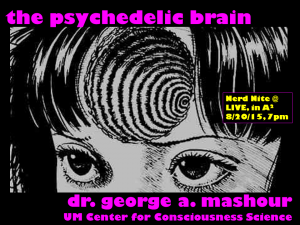
underwent an explosion in the 1960s followed by an implosion in the 1970s. More recently, the neuroscience of psychedelic drugs has emerged from the shadows of a dark past. What are the neural correlates of the psychedelic experience? What does this phenomenology and neurobiology tell us about the functioning of the brain? I will discuss these questions as well as my own research on ketamine.
About George: Dr. Mashour is a neuroscientist, anesthesiologist and the founding director of the Center for Consciousness Science at the University of Michigan.
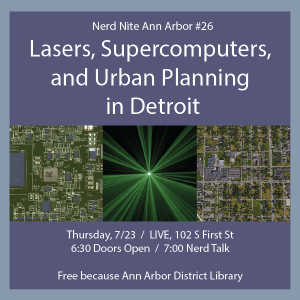 We have an awesome trio of talks on tap this month! Laser artist Mike Gould gives us the skinny on building amazing light displays (with demos!), tech wizard Dave Strenski takes us on a historical tour of uber-powered computers, and urban planner Margi Dewar talks about the future of Detroit. You don’t want to miss it! So grab a friend, grab a beer, and cool your heels at Nerd Nite Ann Arbor!
We have an awesome trio of talks on tap this month! Laser artist Mike Gould gives us the skinny on building amazing light displays (with demos!), tech wizard Dave Strenski takes us on a historical tour of uber-powered computers, and urban planner Margi Dewar talks about the future of Detroit. You don’t want to miss it! So grab a friend, grab a beer, and cool your heels at Nerd Nite Ann Arbor!
When: July 23: 6:30 doors, 7pm nerd stuff
Where: LIVE, 102 S First St, Ann Arbor
$$$: NO COVER because Ann Arbor District Library!
Runs with Lasers – Mike Gould
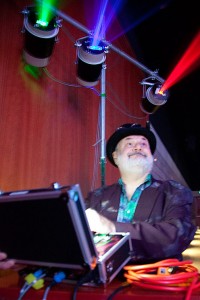 Local laser artist Mike Gould discusses his recent experiences with the Illuminatus Lasers Troupe, including:
Local laser artist Mike Gould discusses his recent experiences with the Illuminatus Lasers Troupe, including:
– The Quest for Mystic Fire – Lasers at Saline Celtic Festival (because, of course).
– Talks with Lasers lecture/demo to educate kids and families to the wonders of coherency.
– Tetraptych: 4 Panels, 12 Lasers, One Wall art piece for DLECTRICITY 2014
– L is for Laser, his science museum piece.
Mike has also done lasers for the UM Stadium half-time show during a night game. (Notre Dame, we won). He’s go an upcoming entry into the Ann Arbor Art Center’s tech+art exhibit, and has made appearances at various Maker Faires, Art Prize, Ignite, FoolMoon, etc.
For more about Mike, wander over yonder:
Calculating 10^18 Results per Second – Dave Strenski
 The world of high performance computing is changing. This presentation will run through a short history of computing highlighting the different types of computations used in computing’s past, including vectorization, parallelization, accelerators, and reconfigurable computing. From this historical perspective, the discussion will lead to what’s needed for the future to reach exa-scale (10^18 floating point operation per second) computing. It will also cover the types of applications that need exa-scale computing and the merging of high performance computing and data analytics. More deets: www.Cray.com and www.SolarYpsi.org.
The world of high performance computing is changing. This presentation will run through a short history of computing highlighting the different types of computations used in computing’s past, including vectorization, parallelization, accelerators, and reconfigurable computing. From this historical perspective, the discussion will lead to what’s needed for the future to reach exa-scale (10^18 floating point operation per second) computing. It will also cover the types of applications that need exa-scale computing and the merging of high performance computing and data analytics. More deets: www.Cray.com and www.SolarYpsi.org.
Detroit: Planning a City After Abandonment – Margi Dewar
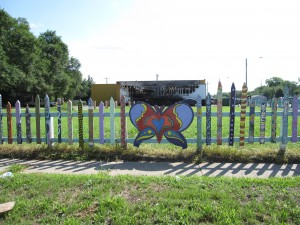
Urban planning as a field focuses on managing development to shape the effects of growth on cities. But what can planners do in cities like Detroit where developing, redeveloping, rebuilding, and revitalizing are
not possibilities? I will lay out directions with a few examples for a different kind of urban planning.
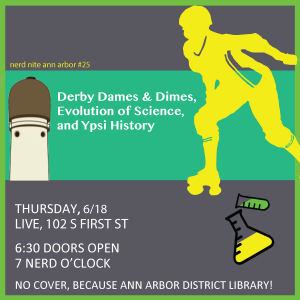 Summertime and the livin’ is nerdy… June brings us an awesome trio of talks about the badass history of roller derby, the development of the science story from bright idea to blog article, and a primer on the last 75 years of history in Ypsilanti. Gonna be a great edition of NNA2, so grab a friend, grab a drink, and join us for an awesome Thursday night!
Summertime and the livin’ is nerdy… June brings us an awesome trio of talks about the badass history of roller derby, the development of the science story from bright idea to blog article, and a primer on the last 75 years of history in Ypsilanti. Gonna be a great edition of NNA2, so grab a friend, grab a drink, and join us for an awesome Thursday night!
When: June 18: 6:30 doors, 7pm nerdins
Where: LIVE, 102 S First St, Ann Arbor
$$$: NO COVER! Ann Arbor District Library rulez!
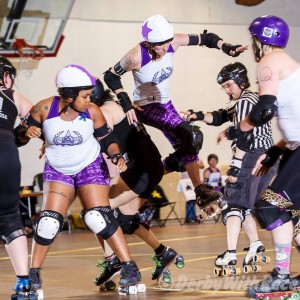
Susan B. Slamthony and Queen McLightning — A Short History of Nearly Everything Roller Derby Related
Learn the history of roller derby from the 1920s to today, how the game is played and what’s been happening for the sport locally.
Find ’em elsewhere, too: @a2derbydimes or Facebook:
AnnArborBrawlStars, A2D2YV, A2D2ABC
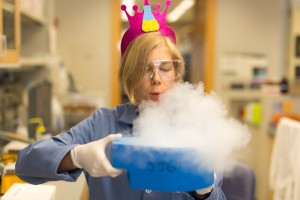
Plot twists and Revelations: The Story of Science — Veronica Taylor
When you think of science, what comes to mind? For many people, science springs to mind a collection of facts they tried to memorize for various exams. I want to show another side of science: the story of science. In my talk, we’ll take a short journey through the drama of the scientific process and learn about how scientific ideas evolve and are communicated. I hope you will leave with a new appreciation of science and what we really learn from research.
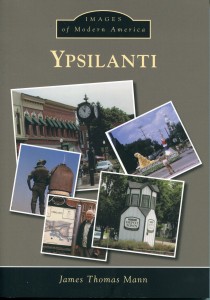
Ypsilanti History — James Mann
Local historian James Mann returns for his fourth Nerd Night talk, and will be speaking on his new book, Ypsilanti, part of the Images of Modern America series from Arcadia Publishing. This is a picture history of the city of Ypsilanti from the 1960’s to the present. James will speak on how Ypsilanti got the most easily misspelled name in the state, the Michigan Murders, and tell the true story of Rosie the Riveter. There is more to Ypsilanti than the Water Tower! Copies of Ypsilanti will be available for purchase.
 It whispers to you, it calls to you. Sugar is a powerful force: it hijacks your brain and wins nearly all the time … I’ll talk about how this happens and also how, even if your mouth is fooled by fake sugar, your brain is not.
It whispers to you, it calls to you. Sugar is a powerful force: it hijacks your brain and wins nearly all the time … I’ll talk about how this happens and also how, even if your mouth is fooled by fake sugar, your brain is not. For as long as we’ve had the Internet, we’ve had online trolls. But what is a troll, really—and how do we tell the difference between trolling and more serious forms of abuse? To build a better and more empathetic web, researchers, designers, and users must work in tandem. In this talk, PhD student Lindsay Blackwell explores the ins and outs of misbehavior online, including efforts to regulate and prevent online harassment.
For as long as we’ve had the Internet, we’ve had online trolls. But what is a troll, really—and how do we tell the difference between trolling and more serious forms of abuse? To build a better and more empathetic web, researchers, designers, and users must work in tandem. In this talk, PhD student Lindsay Blackwell explores the ins and outs of misbehavior online, including efforts to regulate and prevent online harassment. Many of us learned in high school (or earlier!) that the Earth is composed of a crust, mantle, outer core and inner core. But how do we know that? The easy answer is “well, smart scientists said so”. But assuming you consider that an unsatisfactory explanation, Brian will talk about some feats of science and engineering used in the last hundred years or so to explore what lies beneath our feet.
Many of us learned in high school (or earlier!) that the Earth is composed of a crust, mantle, outer core and inner core. But how do we know that? The easy answer is “well, smart scientists said so”. But assuming you consider that an unsatisfactory explanation, Brian will talk about some feats of science and engineering used in the last hundred years or so to explore what lies beneath our feet.































